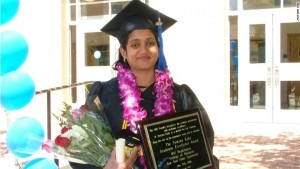
Jyotsna Kaki, ’06 Management Information Systems, works as an accessibility software testing engineer at Google.
When Jyotsna Kaki, ’06 Management Information Systems (MIS), was a student at San Jose State in the Lucas College and Graduate School of Business, she offered to help a classmate in need when the other student fractured a wrist and was unable to take notes. At the time, Kaki discovered the Disability Resource Center (DRC), now known as the Accessible Education Center, where staff members provided her guidance on how to best support her peer.
More than a decade later, Kaki, who became blind while she was a student at SJSU, is still helping others as a software accessibility test engineer for Google. She oversees a central accessibility team of test engineers and trains other Google employees to conduct accessibility testing. Her story was recently featured on CNN Money, with a video and article.
Kaki became blind a semester after she discovered the DRC while helping her classmate. In fall 2004, she woke one morning with blurriness in her right eye. She had been diagnosed with a benign, slow-growing brain tumor as a child. The tumor had grown into the optic nerve and she underwent surgery to regain her sight. Instead, her optic nerve was damaged during the surgery and she was left with a permanent visual impairment.
“It was unexpected,” she said. “I don’t remember much from the month after I found out.”
But her mother tells her less than 10 minutes after discovering she was blind, Kaki called her brother to ask him to help her get back on campus. Within a month, she was back at San Jose State.
When she returned to campus, she felt isolated from her peers who did not interact with her as they had before she lost her vision. Her professors tried to be accommodating, but sometimes did not know how to help her. She turned to the DRC for support. They provided training on how to use screen reading technology, helped her get accessible textbooks and she learned Braille to get through the rest of her coursework.
“Everything pretty much started there (in the DRC),” Kaki said. “Most professors were helpful, but they didn’t have the necessary information.”
Kaki completed her degree two years after she lost her vision with a 3.8 GPA, higher than her GPA before her impairment. After graduation, her brother passed her resume to a friend who worked at Google without telling her. She thought a professor might have sent her resume in, but later discovered it was her brother. When she was invited in for an interview, she did not think she would get the job. They offered her a position and she has since taken on the role of leading a team of engineers. In the last decade, she said she has seen the focus on accessibility increase at Google and she is proud to be part of the efforts.
“It’s been really great because at the end of every day, I can go to sleep satisfied that what I am doing is going to help someone,” she said. “I have been lucky to help other people get assistance and help make products successful. It’s been a great experience and I’ve learned a lot.”